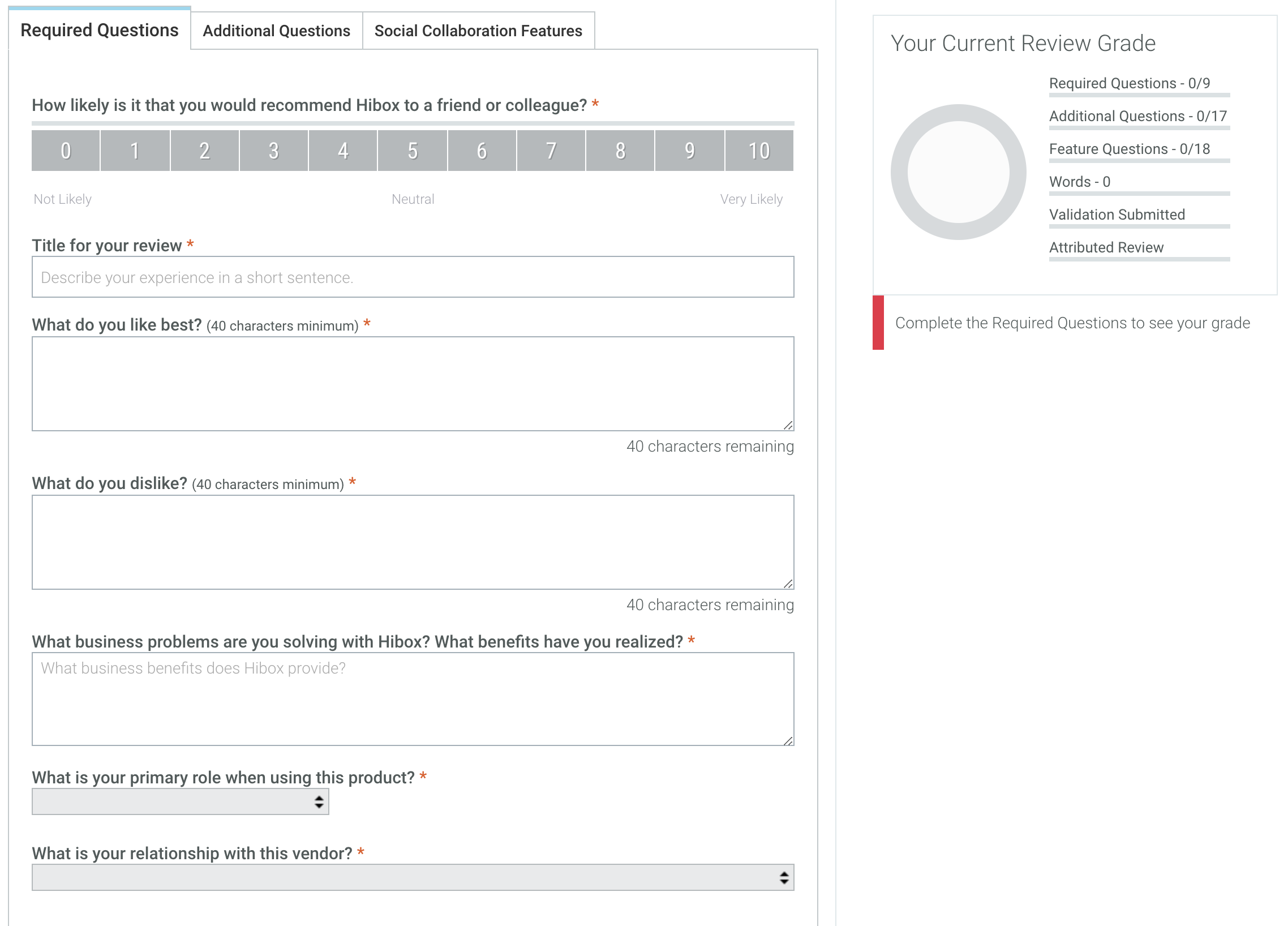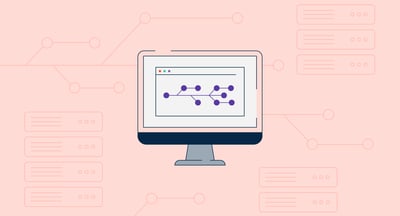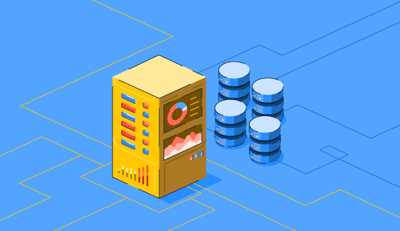

Cloud ERP has been around for more than a decade, and users are starting to better understand its benefits while also identifying its significant challenges. To analyze what ERP users think about cloud vs. on-premises ERP, I looked at more than 2,500 real-user reviews G2 Crowd received in the ERP Systems category.
The results were surprising, mostly because what users think is not aligned with most written content on cloud ERP. Here are some of the conclusions of the analysis, which I will describe in more detail later:
Before providing a detailed analysis, I’ll describe my methodology. All the information used here was provided by ERP user reviews from 110 products listed in our ERP Systems category. For each review, buyers are required to provide answers to 9 mandatory questions and may share their feedback on 17 optional questions.
The image below shows all questions, both mandatory and optional. More details on how we use the responses can be found here.

All statistics are based on the total number of buyers who answered a question, not on the total number of reviews. For instance, 2,150 users provided feedback on quality of support, though the total number of reviews was 2,575.
And now, let’s take a closer look at the main differences between cloud and on-premises ERP.
The short answer is: not really. The long answer is that there are minor differences between the two delivery models, but they are not significant. Let’s take a look at these differences for the following criteria: Meets Requirements, Ease of Use, Ease of Setup and Ease of Admin. The image below summarizes the percentage of respondents that selected scores on a scale from 1–7.
My first reaction when seeing these stats was: Wait a minute, I thought most users hated ERP! It turns out that ERP buyers actually have a love/hate relationship with their systems and the proportion between the two doesn’t seem to change with the delivery model.
Let’s take a look at the “love” and I’ll cover the rest later. Almost 90 percent of respondents gave “good” and “excellent” scores (between 5 and 7) to both delivery models for whether a tool meets requirements. On-premises solutions received more maximum (7/7) ratings (31.9 percent) than the cloud products (27.2 percent).
Though not significant, some difference can be noticed for the following criteria:
Looks like most users really like their ERP systems, right? Not so fast! As you’ll see below, satisfaction can vary quite a lot by company size and industry.
| Tip: Learn how to identify and avoid the most common data migration challenges you might face during an ERP implementation |
The most significant differences between cloud and on-premises ERP can be identified when analyzing the data by company size and industry. As shown below, cloud ERP solutions received fewer high scores than on-premises software, and more low scores (from 1 to 4). At the enterprise level, on-premises ERP has more high scores and also a higher percentage of low ratings. What does this mean?
When looking at the actual reviews, I noticed that small companies are happy to get rid of old and rigid software and replace it with cloud solutions. Enterprise-level companies also wanted to replace their legacy systems but are not extremely happy with the features, price or services provided by cloud software. As for mid-market companies, buyers’ feedback is very similar for both delivery models, which is why I wanted to further analyze the data by industry.
I chose three industries that are very different in terms of the ERP functionality required: accounting, electronics, and wholesale.
For accounting, more than 80 percent of reviewers were very satisfied with their cloud ERP software. This makes sense since accounting is at the core of any ERP product and most vendors have a lot of experience developing this kind of software.
When it comes to electronics, reviewers gave no maximum scores, and most of them were satisfied but not very. This is explained by the fact that companies like the cloud but don’t like the lack of industry-specific features. As some reviewers put it:
“Complete vaporware for any real manufacturing company.” Cloud ERP review by Administrator in Computer Software
"The manufacturing functionality is not as robust as some competitors.” Cloud ERP review by Administrator in Food & Beverages
Finally, the results for the wholesale industry were quite surprising because functional requirements are less complex than manufacturing. However, reviewers gave more high scores than for the other two industries. At the same time, one-third of the reviewers were dissatisfied or somewhat satisfied. Based on respondents’ feedback, it seems that there are good cloud ERP products for wholesale but also an important number of solutions that are trying to get into this space but aren’t yet providing robust features.
Most cloud users are satisfied with Quality of Support or Ease of Doing Business, but these companies are rather small and do not have complex needs. The buyers that require robust or industry-specific systems complained about the fact that additional features and modules can be costly. Some mentioned that they need to hire expensive developers to customize the software or add new functionality.
Support and training can also be expensive, and fixing issues can take a long time. One would think that a flexible delivery model like the cloud would make it easier for vendors to adapt to the needs of their customers and solve problems quickly. That doesn’t seem to be the case, as described by some reviewers:
“Customer service has been difficult and inconsistent.” Cloud ERP review by Lance B.
“I also dislike that when there are problems with the software, getting a fix from the company can take weeks, sometimes longer.” Cloud ERP review by Charles S.
It depends. Standard features are usually affordable, which caused many companies to adopt cloud ERP and then realize that they need additional functionality. It looks like the business model of some cloud ERP vendors is to attract customers with base packages that are easy to use and not very costly, then try to sell extra products or services.
“Getting help or training on anything is difficult and very expensive so I don't feel like I can use it to the fullest extent.” Cloud ERP review by Administrator in Religious Institutions
At the same time, buyers tend to consider that it is worth paying a lot for a robust ERP system that is implemented properly:
“Be ready for a long and expensive implementation, but it can be worth it if done effectively.” Cloud ERP review by Gabriel L.
The most important conclusion is that cloud ERP has obvious benefits such as lower costs and increased flexibility, but it also needs to catch up with more mature solutions when it comes to functionality. In addition, cloud ERP is an excellent option for industries such as professional services, but it may not always be the best choice for manufacturing or distribution.
Make sure buyers understand what is included in the standard package and what needs to be bought separately. While it may be tempting to avoid having this conversation with customers, they will find out eventually, and they will be very frustrated.
“In order to do anything other than view information we would have to pay for additional business users. Not super expensive but wished we'd known that beforehand.” Cloud ERP review by Tyler S.
Also, focus less on the platform and more on the features you provide. A robust ERP solution will bring more benefits in the long term for both you and your customers.
Finally, while I know this will sound like a truism, I’m afraid I have to say it: Don’t take customers for granted. If you’re not sure what I mean, here are a few reasons why buyers replaced ERP systems:
“Lack of support from previous company was the main reason for switching. ” Cloud ERP review by Chris S.
“We needed outside help to get features we didn't have, and to improve the speed and traffic. The features were great in theory, but they didn't function as well as we had hoped they would.” Cloud ERP review by Lindsey M.
Choose the software you REALLY need, by focusing mostly on functionality. While savings are substantial, the features are going to help you more in the long term. On the other hand, investing now in features you may only need later should be done with caution. As a reviewer mentioned, you may end up paying for them without using them:
It is also critical to thoroughly prepare for ERP selection. As a reviewer mentioned, you can never be too prepared:
“You could never enter this process too prepared. There is a startup philosophy out there to wait until “it hurts” and to bootstrap/put off hiring for as long possible to keep costs down. Do not do this! You will read in other reviews that implementation can take a lot longer than anticipated and so it is.
You should also plan on spending one month in both your new and old systems. The first month can be tough, plan on working in your old system and this new one simultaneously.” Cloud ERP review by Eleni P.
|
TIP:Identify where you can cut costs and start saving today. Activate your free G2 Track account and see if you're adding to the $40 billion spent on unused software every year. |
Ready to learn more about accounting-based software? Learn what is ERP and how an it can help your business.
* Please note: Reviews may have been edited for spelling and grammar.
Gabriel’s background includes more than 15 years of experience in all aspects of business software selection and implementation. His research work has involved detailed functional analyses of software vendors from various areas such as ERP, CRM, and HCM. Gheorghiu holds a Bachelor of Arts in business administration from the Academy of Economic Studies in Bucharest (Romania), and a master's degree in territorial project management from Université Paris XII Val de Marne (France).
Some professionals view data lineage as the GPS of data.
 by Sagar Joshi
by Sagar Joshi
Storing large amounts of data means finding solutions that work best for your business.
 by Holly Landis
by Holly Landis
There are more than three billion social media users today, with 11 people creating an account...
 by Devin Pickell
by Devin Pickell
Some professionals view data lineage as the GPS of data.
 by Sagar Joshi
by Sagar Joshi
Storing large amounts of data means finding solutions that work best for your business.
 by Holly Landis
by Holly Landis
Never miss a post.
Subscribe to keep your fingers on the tech pulse.



